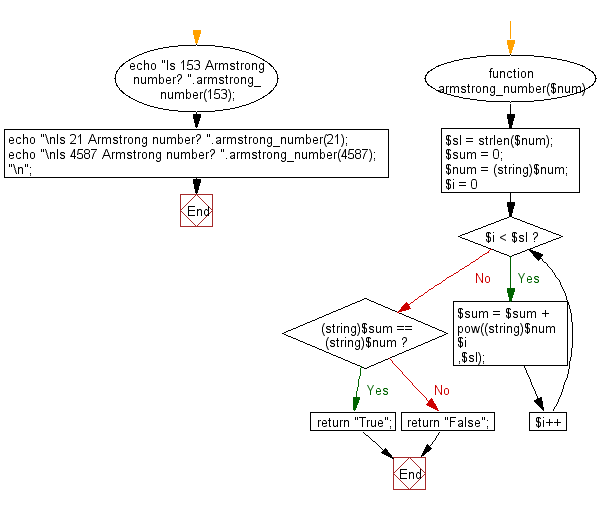PHP Exercises: Check whether a number is an Armstrong number or not
PHP: Exercise-32 with Solution
Write a PHP program to check whether a number is an Armstrong number or not. Return true if the number is Armstrong otherwise return false.
An Armstrong number of three digits is an integer so that the sum of the cubes of its digits is equal to the number itself. For example, 153 is an Armstrong number since 1**3 + 5**3 + 3**3 = 153
Sample Solution: -
PHP Code:
<?php
function armstrong_number($num) {
$sl = strlen($num);
$sum = 0;
$num = (string)$num;
for ($i = 0; $i < $sl; $i++) {
$sum = $sum + pow((string)$num{$i},$sl);
}
if ((string)$sum == (string)$num) {
return "True";
} else {
return "False";
}
}
echo "Is 153 Armstrong number? ".armstrong_number(153);
echo "\nIs 21 Armstrong number? ".armstrong_number(21);
echo "\nIs 4587 Armstrong number? ".armstrong_number(4587);"\n";
?>
Sample Output:
Is 153 Armstrong number? True Is 21 Armstrong number? False Is 4587 Armstrong number? False
Flowchart:

PHP Code Editor:
Have another way to solve this solution? Contribute your code (and comments) through Disqus.
Previous: Write a PHP program to swap two variables.
Next: Write a PHP program to convert word to digit.
What is the difficulty level of this exercise?
Test your Programming skills with w3resource's quiz.
PHP: Tips of the Day
How to Sort Multi-dimensional Array by Value?
Try a usort, If you are still on PHP 5.2 or earlier, you'll have to define a sorting function first:
Example:
function sortByOrder($a, $b) {
return $a['order'] - $b['order'];
}
usort($myArray, 'sortByOrder');
Starting in PHP 5.3, you can use an anonymous function:
usort($myArray, function($a, $b) {
return $a['order'] - $b['order'];
});
And finally with PHP 7 you can use the spaceship operator:
usort($myArray, function($a, $b) {
return $a['order'] <=> $b['order'];
});
To extend this to multi-dimensional sorting, reference the second/third sorting elements if the first is zero - best explained below. You can also use this for sorting on sub-elements.
usort($myArray, function($a, $b) {
$retval = $a['order'] <=> $b['order'];
if ($retval == 0) {
$retval = $a['suborder'] <=> $b['suborder'];
if ($retval == 0) {
$retval = $a['details']['subsuborder'] <=> $b['details']['subsuborder'];
}
}
return $retval;
});
If you need to retain key associations, use uasort() - see comparison of array sorting functions in the manual
Ref : https://bit.ly/3i77vCC
- New Content published on w3resource:
- HTML-CSS Practical: Exercises, Practice, Solution
- Java Regular Expression: Exercises, Practice, Solution
- Scala Programming Exercises, Practice, Solution
- Python Itertools exercises
- Python Numpy exercises
- Python GeoPy Package exercises
- Python Pandas exercises
- Python nltk exercises
- Python BeautifulSoup exercises
- Form Template
- Composer - PHP Package Manager
- PHPUnit - PHP Testing
- Laravel - PHP Framework
- Angular - JavaScript Framework
- Vue - JavaScript Framework
- Jest - JavaScript Testing Framework
